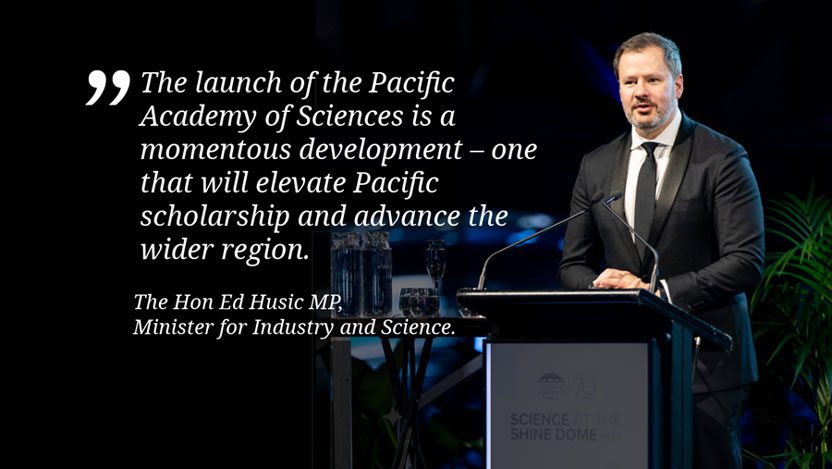
The Science Policy and Diplomacy Newsletter of the Australian Academy of Science highlights important science policy discussions and events in Australia and around the globe. We report on the involvement of science in national and international policy and diplomacy, and the Academy’s contributions to these discussions.

The Australian Academy of Science welcomes the establishment of the Pacific Academy of Sciences, launched alongside the Commonwealth Heads of Government Meeting in Samoa on Wednesday 23 October 2024.
The Pacific Islands is the only region in the world that does not have its own learned academy and a local collective voice for science, despite the region experiencing profound impacts due to climate change.
That has now changed, with the launch of the Pacific Academy of Sciences, and the election of 12 eminent scholars as Foundation Fellows, who will provide a strong voice for science in the region.
The Deputy Prime Minister of Samoa Hon. Tuala Tevaga Iosefo Ponifasio officially launched the Pacific Academy of Sciences on behalf of the Prime Minister of Samoa Hon. Fiame Dr Naomi Mata’afa, saying “This Academy will help to ensure that our partners fully acknowledge our knowledge, leadership and the responsibility we bear for our collective future.”
The new academy will promote the study and application of the natural and social sciences, the humanities, Indigenous Knowledge and technology for the benefit of the Pacific Islands region and beyond.
The Australian Academy of Science is proud to have played a role in the establishment of the new Pacific Academy through its leadership of the International Science Council Regional Focal Point for Asia and the Pacific, along with other partners.
In October 2023, the Regional Focal Point brought together more than 60 Pacific scholars from across the Pacific Island nations, who overwhelmingly agreed to establish a Pacific academy of sciences and humanities. This was one of the first crucial steps towards establishing the Pacific Academy of Sciences.
The Australian Academy of Science, along with the Royal Society Te Aparangi (New Zealand), continued to provide extensive advice on the establishment of a Pacific Academy of Sciences over several months.
Until now, there has been no mechanism for Pacific scholars to convene and bring together their knowledge so it can inform regional and international decision-making, despite the region experiencing profound impacts arising from a changing climate.
More often than not, decisions are made by others about them, not with them, even though local scientists and Indigenous communities possess unique knowledge about their respective regions and inhabitants. That changes from today.
Professor Chennupati Jagadish AC PresAA FREng FTSE
President, Australian Academy of Science
The Pacific Academy of Sciences will support our young people with their career development in the Pacific for the Pacific by providing mentors and building collegiality with peers regionally and globally.
The Pacific Academy of Sciences offers exciting possibilities to connect scholars from across the globe who share a common goal, that is: addressing global challenges through evidence-based science and actionable knowledge.
Professor Teatulohi Matainaho
Papua New Guinea
Foundation Fellow and newly appointed Pacific Academy of Sciences President
The Pacific Academy has been established as a charitable trust to be based in Apia, Samoa.
The first meeting of the Governing Council (Trustees and Foundation Fellows) is set to be held after the launch.

The International Science Council Regional Focal Point for Asia and the Pacific (ISC RFP-AP) is hosted by the Australian Academy of Science. The five-year program (2023–28) is working to ensure that regional needs and priorities are adequately represented in the ISC’s global agenda, that regional voices are actively engaged in the governance and management of the ISC’s work, and that the region benefits from the results of that work.
For more information, email isc-ap@science.org.au.
© 2025 Australian Academy of Science